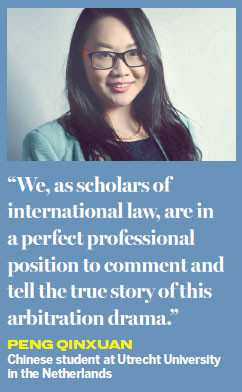Young scholars counter court action
Updated: 2016-07-08 08:07
By Fu Jing in Brussels(China Daily Europe)
|
|||||||||
Overseas Chinese student of international law joins lawyers in challenging the South China Sea tribunal
After studying international law for 11 years, 29-year-old Chinese student Peng Qinxuan is due to obtain her doctorate soon in the Netherlands, which hosts the Permanent Court of Arbitration and the International Court of Justice.
The two courts are key institutions that are supposed to play a fair role as a go-between for disputing parties at international levels.
But when she heard that the arbitral tribunal on the South China Sea, appointed by the PCA in The Hague - a 45-minute train ride from her university - will be issuing a ruling on July 12 on the South China Sea, she says this case has eroded her lasting "passion and trust" in international law.
"I have been closely watching what has happened in the tribunal in previous years and as the day of issuing the ruling is approaching, we, as scholars of international law, are in a perfect professional position to comment and tell the true story of this arbitration drama," Peng, who studies at Utrecht University, told China Daily.
From an academic perspective, Peng has many reasons why this case, initiated by the Philippines, has eroded her "trust and passion".

First, the appeals of the Philippines are purely about maritime entitlement, while China insists that this is a sovereignty dispute, on which the PCA has no jurisdiction under the framework of the UN Convention on the Law of the Sea.
Second, the tribunal can only arbitrate under the precondition that both sides, China and the Philippines, authorize it to do so, in line with international law. But China has never asked for that, and international law says China did not have to do so.
But the PCA went ahead and formed a tribunal, and accepted the case, which, Peng says, is not in the basic spirit of rule of international law. "It is obvious that the PCA and tribunal have acted beyond their competence, though they know the law perfectly well."
Despite that, the West has been encouraging a biased understanding of the case, with the Western media playing an unfair role, concluding that "China is threatening" without having a careful look at the whole picture.
"This is dangerous and we need to change, and we also need to help the public in the world know the nature of international law," says Peng, chairwoman of the Chinese Students Union in the Netherlands.
"A scholar of international law should shoulder responsibility to let the public know the true story."
Since the tribunal started work several years ago, Peng has organized two panel discussions at her university to discuss the true nature of the case. And she is busy talking on various occasions.
Since April, she has mobilized up to 30 young Chinese scholars and students of law and lawyers in the Netherlands, who had intensively studied this case to draft a joint statement on their professional stances on the South China Sea case. Since then, they worked day and night on the text of the open letter, which is 12 pages and 2,500 words in length.
"We are courageous in challenging the doings of the tribunal and the Philippines in a professional fashion," says Peng.
The letter also stated in detail that state consent is the basis of the compulsory arbitration, while the dispute between China and the Philippines is on territorial and maritime delimitation. The scholars say in the letter that much evidence has shown that the tribunal has abused the legal process and taken wrong actions.
The letter, seen by China Daily, concludes that the award of the tribunal has no binding force as it has no jurisdiction over the dispute.
"In order to show our full professionalism," Peng says, her team has asked a British English teacher at her university and an interpreter for the United Nations to polish the language.
"We have prepared the English, Dutch and Chinese versions, and it consists of a full text and summary," says Peng. "We conclude that the ruling will be neither binding nor helpful."
She says the letter has been jointly signed by the team of scholars, lawyers and students who drafted it. So far, more than 300 supporters have offered their backing and by July 12, when the tribunal is expected to announce its verdict, the number of supporters should surpass 1,000, she says.
She plans to make the open letter public before the result is announced. She says the group is gathering the email addresses of international organizations while making it ready for Facebook, Twitter and other social media platforms.
"We are fully prepared to take more actions to make people at home and abroad know the true story about the case," says Peng, adding that a seminar in the Netherlands is being planned.
fujing@chinadaily.com.cn
(China Daily European Weekly 07/08/2016 page7)
Today's Top News
5 Dallas police killed at protest against police shooting
Ministry slams US-Korean THAAD deployment
Shoring up support
UK Iraq report highly critical of Tony Blair
UK invasion of Iraq was not last resort: Report
Berlusconi accepts Chinese offer for AC Milan
UK consultancy loses license, Chinese graduates being told to leave
Chinese online retailers offer 'Brexit sales' as sterling hits record lows
Hot Topics
Lunar probe , China growth forecasts, Emission rules get tougher, China seen through 'colored lens', International board,
Editor's Picks

|

|

|

|

|

|







